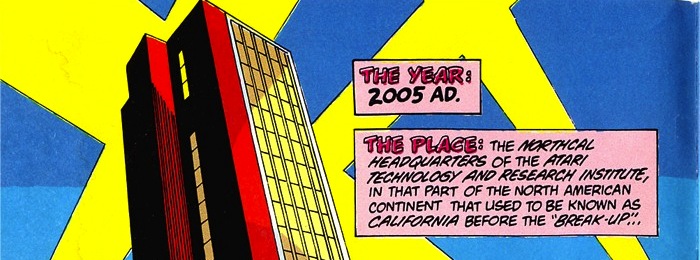... but I must interrupt the proceedings for some nominal connection to current events: Cyan's Rand brothers (of "Myst" fame) are involved in the closing days of a Kickstarter campaign.
I never liked Myst, though I could never appreciate it on its own merits: I saw it as occupying a position of populist devolution in the adventure game genre: beginning from a high point of Infocom, things were muddied somewhat with graphics' entry into the industry -- first static, "Mystery House" illustrations, then the PCjr-dazzling King's Quest presentation which totally obfuscated the text parser remaining at the heart of the game, then when Maniac Mansion boiled it explicitly down to x possible verbs and y possible nouns (laying bare that there were hard limits on the combinatorial possibilities, though practically we always knew that to be the case), then when Sam & Max reduced those to four actions on a fob... then to Myst, which abstracted out the inventory to the point where all that could be done was pointing, clicking, and eventually seeing if you noticed what happened two miles away. The adventure genre had gradually, if beautifully, degraded from somewhere you could solve problems with simulated interactions between medium-sized dry goods and superficial conversations with unintelligent NPCs to a kind of abstract and arbitrary giant sterile machine in which you couldn't take anything with you or interact with anyone. The genre had gotten streamlined and all the technological advance yielded was a more gobsmacking uncanny valley presentation, immaculately laying out a sterile, lifeless fantasy landscape on very restrictive (yet rarely conveniently-telegraphed) rails.
I always resented Myst as the antichrist of the adventure game genre; the Sierra / Lucasarts graphical adventure games had hammered in the final nails in the coffin of the text adventures (which had admittedly largely already done the work of digging their own grave) and then when this Hypercard wonder hit the scene and sold a million CD-ROM drives, it demonstrated to a generation of lazy game developers that all you needed to make a fortune (hey yes, that reminds me -- why do they need to Kickstart this game when they earned mountains of cash in the '90s?) was a series of still images and some mechanism, however obfuscated, of transitioning between them.
Anyhow, I didn't think that Myst made for the best candidate of conversion into a comic book, but anything that is sufficiently successful in a given medium will be given carte blanche for transition into an unrelated one. (And who knows, perhaps Myst would actually work better as a comic than as a game -- though I don't know too many people who want to read a comic about turning valves on mysterious and forgotten disused machinery.)
Interactive game? Not like the other kind? Featuring characters from the game? Do they all creep into the panel, say their piece and then slink off again like monologist characters wearing different costumes in some one-man play? Is one of the characters a broken internal combustion engine? (No wait, that can be compelling -- Planescape did it!)A journey of wonder through a mystical realm . . .
MYST
The Book of the Black ShipsA new comics series featuring characters from the best-selling interactive game.
On sale September through December.
I should give Myst more credit. Some people whose opinion of games I value highly think quite highly of Myst (Zarf made a user-modifiable MMORPG fangame called Seltani for which a contest of sorts just opened). I know there is a great deal of lore surrounding and expanding on the games as I have a suite of three or four novels on the subject in my basement, and if I cared about the games at all I might actually read them. I imagine they contribute a great deal to the now-15-year-old comic book series... that or it might just be a largely-unrelated venture with the name of a successful franchise borrowed to brand it with the whiff of success.
(In any case, the brand association was insufficient to ensure the comic arc's successful publication; the series ended after two of four planned issues.)

.JPG)
No comments:
Post a Comment